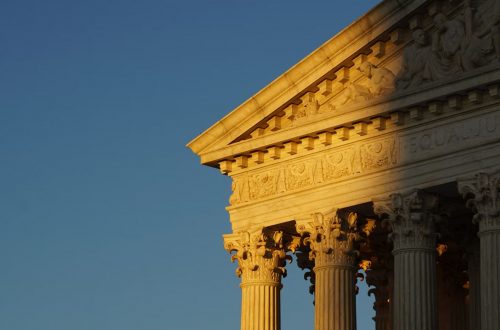I am writing this short essay as an appeal to Southern Baptists who care about the pro-life cause. Right now, there is an effort underway by what I believe to be a tiny minority in the SBC to reverse the SBC’s longstanding commitment to the pro-life cause. They call themselves “Abolitionists,” but they are not the only ones who support the abolition of abortion. All sides of this debate want to see abortion abolished. The Abolitionists, however, condemn and repudiate the pro-life movement’s efforts to restrict abortion in whatever measure possible.
After the Roe decision in 1973, the pro-life movement eventually coalesced around an incrementalist strategy to abolish abortion. Pro-lifers realized that because Roe prevented them from passing laws to outright end abortion, they would have to take whatever ground they could to save as many unborn lives as possible. So we have tried to pass parental notification laws. We’ve supported the Hyde Amendment to prevent taxpayer funded abortions. We’ve supported fetal heartbeat laws in an attempt to outlaw abortion. We supported and passed a ban on the reprehensible procedure known as partial birth abortion. Etc.
The so-called Abolitionist movement condemns all of these measures as compromises with evil. The abolitionists even oppose any exception to save the life of a mother. The only laws or public policies they support are ones that completely abolish abortion all at once. Anything short of that fails to honor the humanity of the unborn. Not only do Abolitionists oppose pro-life policies, they also publicly condemn and shame pro-lifers as compromisers with evil.
To use a football analogy, pro-lifers would love to have a 100-yard touchdown run. But if that isn’t possible, then pro-lifers are eager and willing to take 5-10 yard runs in a sustained drive down the field toward the same end. Abolitionists only accept 100-yard touchdown runs. Anything short a 100-yard touchdown run should be condemned and repudiated as a grave compromise with evil. That’s the difference between the pro-life movement and so-called Abolitionism. It’s not about the final goal of abolishing abortion but about how to get there. Pro-lifers will take whatever ground they can get. Abolitionists are all-or-nothing.
If we had followed an Abolitionist strategy, we would not be on the cusp of the Supreme Court overturning Roe v. Wade. The Mississippi fetal heartbeat law that is the basis for the Supreme Court’s recently-leaked Dobbs decision is a pro-life, incrementalist law. Abolitionists oppose that law and thereby support an all-or-nothing approach that would have undermined the most significant pro-life victory in two generations.
Southern Baptists have expressed themselves clearly decade after decade in resolution after resolution to be on the side of the pro-life movement. Southern Baptist resolutions have long supported incrementalist measures to abolish abortion. We have put ourselves on the side of those moving the ball down the field 5-10 yards at a time. We would welcome a 100-yard dash for the endzone. But short of that, we’ve been more than willing to support measures to take whatever ground we can get. That is why we have supported legislation to outlaw partial birth abortion, to keep the Hyde Amendment in place, to pass parental notification laws, etc. Our record on this goes back at least 41 years.
All of that changed in Nashville last year. At last year’s convention, Southern Baptist messengers passed an Abolitionist resolution that amounts to a repudiation of the pro-life movement. In fact, this resolution is a break with every single pro-life resolution that the SBC has passed in the last 41 years.
How could such a thing happen in a denomination that is known for its strong pro-life convictions? Before the convention, a group of Abolitionists submitted a resolution that the Resolutions Committee declined. The group showed up at the convention and flooded the messengers with pamphlets in favor of the resolution. As a result, the Abolitionists were able to convince messengers to vote the resolution out of the committee for an up or down vote on the floor. After a brief debate, the messengers overwhelmingly approved it.
The reason that messengers approved the resolution was because it was clearly anti-abortion. Southern Baptists are against abortion, and we don’t like to miss any opportunity to make that known. But I think it was lost on the messengers that the resolution was also a repudiation of the pro-life movement. And therein is the problem. While the resolution supports the immediate abolition of abortion (which we all support), it also rejects all pro-life measures aimed at limiting the number of babies killed through abortion every year. Thus, the resolution is opposed to the Hyde Amendment, a ban on partial birth abortion, fetal heartbeat laws, parental notification laws, and a host of other pro-life measures that have saved millions of unborn lives. The resolution makes the perfect the enemy of the good and has thrown the pro-life movement under the bus in the process.
That is why I voted against the resolution and why I wish my fellow messengers had as well. To be sure, I don’t think the messengers fully understood what the resolution committed them to. The reason I say that is because the same messengers who passed the Abolitionist resolution also passed another resolution supporting a pro-life, incrementalist measure known as the Hyde Amendment. The two resolutions contradict each other, and I suspect the messengers were not fully aware that voting for the Abolitionist resolution implies a repudiation of their overwhelming support of the Hyde Amendment. If they had been, I doubt they would have voted in favor of a measure that undermines their longstanding pro-life convictions. It was impossible to convince messengers of the problems in the short time allotted for debate. But now that the resolution is on the books, we desperately need to revisit this to explain what went wrong and why.
And that is why I am writing this post. If you are a Southern Baptist and you care about the pro-life cause in the SBC, now is the time to make your voice heard. Speak up for the incremental gains we have made over the last several decades, and keep pushing the ball down the field until we get into the endzone. And by all means, don’t tackle your own teammate when he’s trying to get to the same goal you are. The Abolitionists are trying to do just that by attacking pro-lifers right at the time that they are about to make their biggest gain in two generations—the overturning of Roe.
If you support the pro-life cause and plan to be a messenger to the SBC convention in Anaheim next month, please be ready for a debate on any abortion resolution that may come up. Be ready to recognize the difference between pro-life language and Abolitionist language, and raise your ballot in favor of the pro-life cause. Send a resounding message that you wish to be a part of the long pro-life effort to save whatever lives we can on the way to total abolition of the scourge of abortion.
For more reading on this issue and what happened at last year’s convention, I recommend four articles that break it all down.
First, I was joined by six SBC ethics professors in an essay last year explaining “Why We Voted against an Anti-Abortion Resolution at the SBC.”
Second, Dana Hall McCain was on the SBC Resolutions Committee and has an essay titled “Southern Baptist Convention’s problematic abortion resolution.”
Third, Scott Klusendorf and Marc Weaver have a trenchant piece arguing that it is wrong to be “Trading Lives for Prophets.”
Fourth, Scott Klusendorf has a must-read article on incrementalism titled, “Saving Some, Standing for All: A Defense of Pro-Life Incrementalism (And the Problem with Abolitionism).”
All four of these essays get at the heart of the matter, and I hope you will read them.
UPDATE: I just saw R.C. Sproul Jr. post the following response to my essay:
Dear brother, the only way abolitionism is a “repudiation” of the “pro-life movement” is if incrementalism, rather than ending abortion is its defining quality. Your rhetoric is getting away from you. Abolitionists reject incrementalism, not the pro-life movement. Please recant.
— R.C. Sproul Jr. (@rcsprouljr) May 14, 2022
The pro-life movement in the main is an incrementalist movement and has been for decades. For example, notice how major pro-life advocacy organizations all embrace incrementalism. From Americans United for Life to Susan B. Anthonys List to National Right to Life, they all embrace incrementalist policies with the ultimate aim of ending abortion. Not to recognize this is just a failure to understand the mainstream of the pro-life movement. That is why I am saying that to reject incrementalism is to reject the mainstream of the pro-life movement.
That is why Abolitionists themselves define themselves against the pro-life movement. For example, a leading Abolitionist organization called “Free the States” is careful to stipulate that their position is “Abolitionist, Not Pro-Life.” This is their language, not mine. And they regularly attack pro-lifers as compromising with evil.
This anti-prolife rhetoric is common among Abolitionists, and it appeared in last year’s abolitionist resolution, which spoke disparagingly about incrementalism, saying that such measures were “appalling” and merely served as “guidelines for when, where, why, and how to obtain legal abortion.” The resolution even says that incremental measures are the moral equivalent of approving abortion. Here’s the relevant language from the resolution:
Over the past 48 years with 60+ million abortions, traditional Pro-life laws, though well intended, have not established equal protection and justice for the preborn, but on the contrary, appallingly have established incremental, regulatory guidelines for when, where, why, and how to obtain legal abortion of innocent preborn children, thereby legally sanctioning abortion.
The original language of the Abolitionist resolution went on to say this:
We will not embrace an incremental approach to ending abortion because it challenges God’s Lordship over the heart and the conscience, and rejects His call to repent of sin completely and immediately…
Thankfully, pro-life messenger Chris Garner moved an amendment from the floor and was able to have the word “alone” added after the word “approach.” But in my view, this good change wasn’t enough to overcome the resolution’s problems.
But my point is that abolitionists opposed that amendment. They wanted incrementalism rejected outright, which is why I am saying that Abolitionists reject the pro-life movement. They do so because the movement relies on incrementalism. I am not saying that there are no areas of overlap between the beliefs of pro-lifers and Abolitionists. I am saying that Abolitionists reject the pro-life movement’s approach to abolishing abortion, which makes use of incremental advances where total victory is not possible.
UPDATE 2: I just saw that Tom Ascol posted a thread objecting to at least part of the argument in this post. He writes:
Recently, @DennyBurk argued that SBC messengers did not understand the 2021 resolution “On Abolishing Abortion” when they overwhelmingly adopted it. I think he is mistaken. And I find Tom Nettles’ reasoning on the question far more convincing. 1/https://t.co/SI5FhO9fPT
— Tom @tomascol (@tomascol) May 17, 2022
I’m not a mind-reader. I could be wrong about what the messengers intended, but I don’t think I am. And here’s why.
As I argued above, the messengers passed a resolution supporting the Hyde Amendment, which is an incremental pro-life measure that Southern Baptists have been supporting for at least 40 years. How can you explain messengers’ voting for an Abolitionist resolution that repudiates Hyde and then voting for another resolution that affirms Hyde? It’s far more likely that the implications of the Abolitionist resolution were not clear to messengers and that the messengers did not intend to repudiate their decades-long, documented support of the pro-life movement. Richard Land just made the same observation, saying:
This resolution is not, I believe, indicative of where the vast majority of Southern Baptists are on the issue. Here are the reasons why I believe this to be so. First, the same convention meeting that passed this resolution also overwhelmingly passed a resolution commending the Hyde Amendment, a classic case of “incrementalism” in that Hyde forbids the use of federal tax funding or state matching Medicaid funds for almost all abortions. Unless the Southern Baptists attending the Convention were schizophrenic, one of the two resolutions is an anomaly.
I think Dr. Land is right.
But again, I could be wrong. If I am and I find myself in the minority in the SBC, that doesn’t change my view that pro-life incrementalism is a principled, biblical approach to working for the abolition of abortion. I will continue to support efforts to take as much ground as we can and to save as many lives as we can on the way to abolition. And I will continue to make the case to my brothers and sisters in the SBC that the Abolitionist strategy is unwise and unlikely to make much headway toward the ultimate goal.
We are on the verge of seeing the Supreme Court overturn Roe v. Wade. It’s the single most important pro-life achievement in two generations, and it happened because Mississippians passed a pro-life, incrementalist law. This never would have happened had we followed the strategy of the Abolitionists. I want Southern Baptists to be in the fight, not standing on the sidelines. The sidelines are exactly where Southern Baptists would be if they were to follow the all-or-nothing approach of the Abolitionists.






